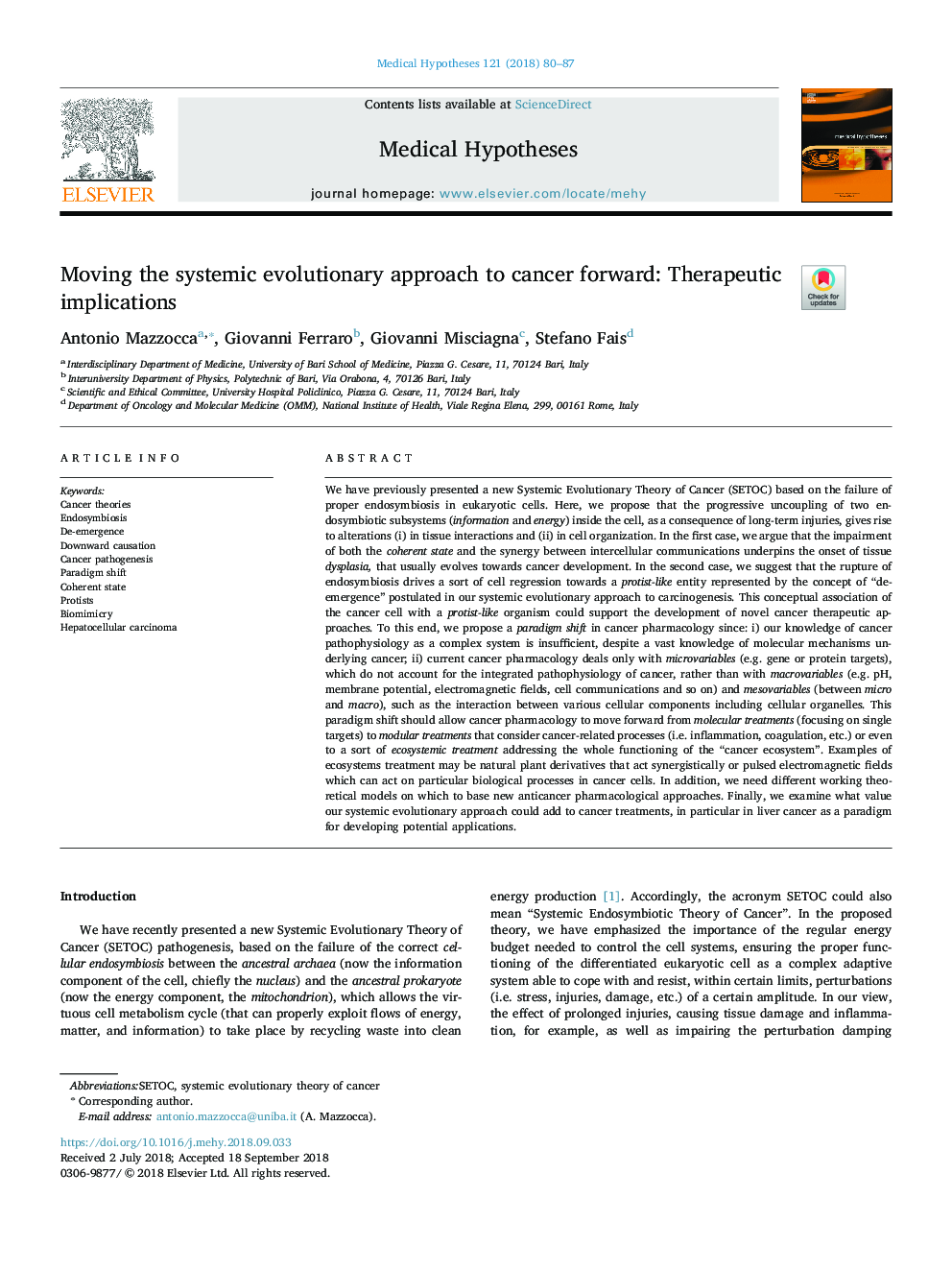| کد مقاله | کد نشریه | سال انتشار | مقاله انگلیسی | نسخه تمام متن |
|---|---|---|---|---|
| 10158233 | 1666517 | 2018 | 8 صفحه PDF | دانلود رایگان |
عنوان انگلیسی مقاله ISI
Moving the systemic evolutionary approach to cancer forward: Therapeutic implications
ترجمه فارسی عنوان
حرکت رویکرد تکاملی سیستمیک به سرطان به جلو: پیامدهای درمانی
دانلود مقاله + سفارش ترجمه
دانلود مقاله ISI انگلیسی
رایگان برای ایرانیان
کلمات کلیدی
موضوعات مرتبط
علوم زیستی و بیوفناوری
بیوشیمی، ژنتیک و زیست شناسی مولکولی
زیست شناسی تکاملی
چکیده انگلیسی
We have previously presented a new Systemic Evolutionary Theory of Cancer (SETOC) based on the failure of proper endosymbiosis in eukaryotic cells. Here, we propose that the progressive uncoupling of two endosymbiotic subsystems (information and energy) inside the cell, as a consequence of long-term injuries, gives rise to alterations (i) in tissue interactions and (ii) in cell organization. In the first case, we argue that the impairment of both the coherent state and the synergy between intercellular communications underpins the onset of tissue dysplasia, that usually evolves towards cancer development. In the second case, we suggest that the rupture of endosymbiosis drives a sort of cell regression towards a protist-like entity represented by the concept of “de-emergence” postulated in our systemic evolutionary approach to carcinogenesis. This conceptual association of the cancer cell with a protist-like organism could support the development of novel cancer therapeutic approaches. To this end, we propose a paradigm shift in cancer pharmacology since: i) our knowledge of cancer pathophysiology as a complex system is insufficient, despite a vast knowledge of molecular mechanisms underlying cancer; ii) current cancer pharmacology deals only with microvariables (e.g. gene or protein targets), which do not account for the integrated pathophysiology of cancer, rather than with macrovariables (e.g. pH, membrane potential, electromagnetic fields, cell communications and so on) and mesovariables (between micro and macro), such as the interaction between various cellular components including cellular organelles. This paradigm shift should allow cancer pharmacology to move forward from molecular treatments (focusing on single targets) to modular treatments that consider cancer-related processes (i.e. inflammation, coagulation, etc.) or even to a sort of ecosystemic treatment addressing the whole functioning of the “cancer ecosystem”. Examples of ecosystems treatment may be natural plant derivatives that act synergistically or pulsed electromagnetic fields which can act on particular biological processes in cancer cells. In addition, we need different working theoretical models on which to base new anticancer pharmacological approaches. Finally, we examine what value our systemic evolutionary approach could add to cancer treatments, in particular in liver cancer as a paradigm for developing potential applications.
ناشر
Database: Elsevier - ScienceDirect (ساینس دایرکت)
Journal: Medical Hypotheses - Volume 121, December 2018, Pages 80-87
Journal: Medical Hypotheses - Volume 121, December 2018, Pages 80-87
نویسندگان
Antonio Mazzocca, Giovanni Ferraro, Giovanni Misciagna, Stefano Fais,
